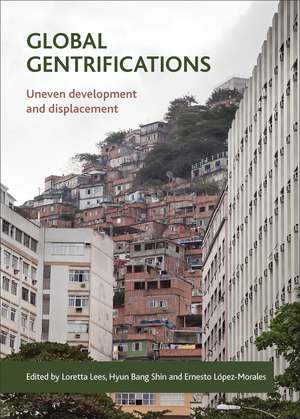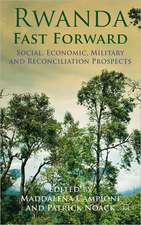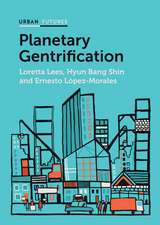Global Gentrifications: Uneven Development and Displacement
Editat de Loretta Lees, Hyun Bang Shin, Ernesto López-Moralesen Limba Engleză Hardback – 25 ian 2015
Under contemporary capitalism the extraction of value from the built environment has escalated, a phenomenon working in tandem with other urban processes to lay the foundations for the exploitative processes of gentrification worldwide. Global Gentrifications critically assesses and tests the meaning and significance of gentrification in places outside the usual suspects of the Global North. Informed by a rich array of case studies from cities in Asia, Latin America, Africa, Southern Europe, and beyond, the book illuminates both the geographical generalities and specificities associated with the uneven process of gentrification globally. Highlighting the intensifying global struggles over urban space, it underlines gentrification as a growing and important battleground in the contemporary world, making the book a vital resource for students and academics as well as policy makers, planners, and community organizations.
| Toate formatele și edițiile | Preț | Express |
|---|---|---|
| Paperback (1) | 376.22 lei 3-5 săpt. | |
| Bristol University Press – 25 ian 2015 | 376.22 lei 3-5 săpt. | |
| Hardback (1) | 942.42 lei 6-8 săpt. | |
| Bristol University Press – 25 ian 2015 | 942.42 lei 6-8 săpt. |
Preț: 942.42 lei
Preț vechi: 1223.92 lei
-23% Nou
Puncte Express: 1414
Preț estimativ în valută:
180.32€ • 188.29$ • 148.91£
180.32€ • 188.29$ • 148.91£
Carte tipărită la comandă
Livrare economică 15-29 aprilie
Preluare comenzi: 021 569.72.76
Specificații
ISBN-13: 9781447313472
ISBN-10: 144731347X
Pagini: 416
Ilustrații: 71 figures, 11 tables
Dimensiuni: 171 x 241 x 30 mm
Greutate: 0.98 kg
Editura: Bristol University Press
Colecția Policy Press
ISBN-10: 144731347X
Pagini: 416
Ilustrații: 71 figures, 11 tables
Dimensiuni: 171 x 241 x 30 mm
Greutate: 0.98 kg
Editura: Bristol University Press
Colecția Policy Press
Notă biografică
Loretta Lees is professor of human geography and director of research in the Department of Geography at the University of Leicester, UK. She is coeditor, most recently, of Sustainable London?: The Future of a Global City, also published by Policy Press. Hyun Bang Shin is associate professor of geography and urban studies in the Department of Geography and Environment at the London School of Economics and Political Science. Ernesto López-Morales is associate professor in the Faculty of Architecture and Urbanism at the University of Chile.
Cuprins
Introduction: ‘gentrification’ – a global urban process?
~ Loretta Lees, Hyun Bang Shin and Ernesto López-Morales
Unravelling the yarn of gentrification trends in the contested inner city of Athens
~ Georgia Alexandri
Slum gentrification in Lisbon, Portugal: displacement and the imagined futures of an informal settlement
~ Eduardo Ascensão
City upgraded: redesigning and disciplining downtown Abu Dhabi
~ Surajit Chakravarty and Abdellatif Qamhaieh
Confronting favela chic: the gentrification of informal settlements in Rio de Janeiro, Brazil
~ Jake Cummings
Rethinking gentrification in India: displacement, dispossession and the spectre of development
~ Sapana Doshi
The prospects of gentrification in downtown Cairo: artists, private investment and the neglectful state
~ Mohamed Elshahed
Widespread and diverse forms of gentrification in Israel
~ Amiram Gonen
The endogenous dynamics of urban renewal and gentrification in Seoul
~ Seong-Kyu Ha
Value extraction from land and real estate in Karachi
~ Arif Hasan
Gentrification in Buenos Aires: global trends and local features
~ Hilda Herzer, María Mercedes Di Virgilio and María Carla Rodríguez
Promoting private interest by public hands? The gentrification of public lands by housing policies in Taipei City
~ Liling Huang
The making of, and resistance to, state-led gentrification in Istanbul, Turkey
~ Tolga Islam and Bahar Sakızlıoglu
Gentrification, neoliberalism and loss in Puebla, Mexico
~ Gareth Jones
Capital, state and conflict: the various drivers of diverse gentrification processes in Beirut, Lebanon
~ Marieke Krijnen and Christiaan De Beukelaer
Gentrification in Nigeria: the case of two housing estates in Lagos
~ Chinwe Nwanna
Gentrification in China?
~ Julie Ren
Emerging retail gentrification in Santiago de Chile: the case of Italia-Caupolicán
~ Elke Schlack and Neil Turnbull
Gentrification dispositifs in the historic centre of Madrid: a reconsideration of urban governmentality and state-led urban reconfiguration
~ Jorge Sequera and Michael Janoschka
When authoritarianism embraces gentrification – the case of Old Damascus, Syria
~ Yannick Sudermann
The place of gentrification in Cape Town
~ Annika Teppo and Marianne Millstein
Conclusion: global gentrifications
~ Loretta Lees, Hyun Bang Shin and Ernesto López-Morales
Afterword The adventure of generic gentrification
~ Eric Clark
~ Loretta Lees, Hyun Bang Shin and Ernesto López-Morales
Unravelling the yarn of gentrification trends in the contested inner city of Athens
~ Georgia Alexandri
Slum gentrification in Lisbon, Portugal: displacement and the imagined futures of an informal settlement
~ Eduardo Ascensão
City upgraded: redesigning and disciplining downtown Abu Dhabi
~ Surajit Chakravarty and Abdellatif Qamhaieh
Confronting favela chic: the gentrification of informal settlements in Rio de Janeiro, Brazil
~ Jake Cummings
Rethinking gentrification in India: displacement, dispossession and the spectre of development
~ Sapana Doshi
The prospects of gentrification in downtown Cairo: artists, private investment and the neglectful state
~ Mohamed Elshahed
Widespread and diverse forms of gentrification in Israel
~ Amiram Gonen
The endogenous dynamics of urban renewal and gentrification in Seoul
~ Seong-Kyu Ha
Value extraction from land and real estate in Karachi
~ Arif Hasan
Gentrification in Buenos Aires: global trends and local features
~ Hilda Herzer, María Mercedes Di Virgilio and María Carla Rodríguez
Promoting private interest by public hands? The gentrification of public lands by housing policies in Taipei City
~ Liling Huang
The making of, and resistance to, state-led gentrification in Istanbul, Turkey
~ Tolga Islam and Bahar Sakızlıoglu
Gentrification, neoliberalism and loss in Puebla, Mexico
~ Gareth Jones
Capital, state and conflict: the various drivers of diverse gentrification processes in Beirut, Lebanon
~ Marieke Krijnen and Christiaan De Beukelaer
Gentrification in Nigeria: the case of two housing estates in Lagos
~ Chinwe Nwanna
Gentrification in China?
~ Julie Ren
Emerging retail gentrification in Santiago de Chile: the case of Italia-Caupolicán
~ Elke Schlack and Neil Turnbull
Gentrification dispositifs in the historic centre of Madrid: a reconsideration of urban governmentality and state-led urban reconfiguration
~ Jorge Sequera and Michael Janoschka
When authoritarianism embraces gentrification – the case of Old Damascus, Syria
~ Yannick Sudermann
The place of gentrification in Cape Town
~ Annika Teppo and Marianne Millstein
Conclusion: global gentrifications
~ Loretta Lees, Hyun Bang Shin and Ernesto López-Morales
Afterword The adventure of generic gentrification
~ Eric Clark
Recenzii
"This book is a noteworthy effort to break down the traditional theoretical framework that linked, from the outset, the study of gentrification to the Anglo-American model city of the Global North."
"The ambition and the achievement of such a wide-ranging collaborative project is an object lesson to the discipline as a whole."
“The political economy of inequality and poverty is foundational for understanding cities everywhere. This wonderfully curated volume on gentrification does this to illuminate urban realities of the global south.”
“This magnificent collection of gentrification studies interrogates this classic western-derived concept at an unprecedentedly global scale. The book profoundly extends the scope of gentrification research and reinvigorates the notion from the perspective of comparative urbanism.”
“This remarkable book, edited with clarity of vision and political purpose, is sensitive to the ‘new comparative urbanism’ whilst arguing that to ‘unlearn’ how we theorize gentrification would be highly questionable. The circulation of capital and the dominance of speculative landed developer interests in cities are leading to massive displacement and social suffering, and this timely volume reminds us that these issues should be at the forefront of our inquiries.”




























